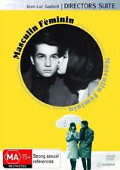
France / Sweden 1966
Directed by
Jean-Luc Godard
105 minutes
Rated MA
Reviewed by
Bernard Hemingway

Masculin, Feminin
Godard's 11th feature is slight in itself although interesting in the context of his oeuvre, being a kind of pop precursor to One Plus One (1968). Here the Rolling Stones are replaced by a pretty girl (Chantal Goya, a real-life "yé-yé" star), the gun-toting Black Power revolutionaries by everyone's favourite Nouvelle Vague punk, Jean-Pierre Léaud, who plays an intense, 21-year-old would-be revolutionary who writes slogans on walls and is given to blurting out Leftist insults to people he doesn't like. Stylistically too, the film is lighter, albeit still characteristically Godard - episodic and elliptical with a loose narrative fragmented by voice-overed musings, errant asides (such as Léaud declaiming the importance of the correct aspect ratio to a projectionist) and one of Godard's favourite techniques of the period, the sociological interview. And there are also his always-wonderful inter-titles.
Although just a little too long in its ramble for the most part Masculin, Féminin, a loose adaptation of two Guy de Maupassant short stories, The Signal and Paul's Mistress is an enjoyable romp through mid-60s Paris (Brigitte Bardot makes a cameo appearance as herself), Godard giving a very effective portrait of what he calls "the children of Marx and Coca-Cola", with Léaud charming as Paul, a mixture of self-centered arrogance and sweet naivete, cynicism and idealism, who, despite his pretensions to intellectual superiority, cannot resist the allure of a pretty girl.
DVD Extras: All new restored print; an audio commentary by Monash University academic, Adrian Martin; a short film by Godard, Charlotte et son Jules; and the original theatrical trailer and poster artwork.
Available from: Madman
Want something different?





